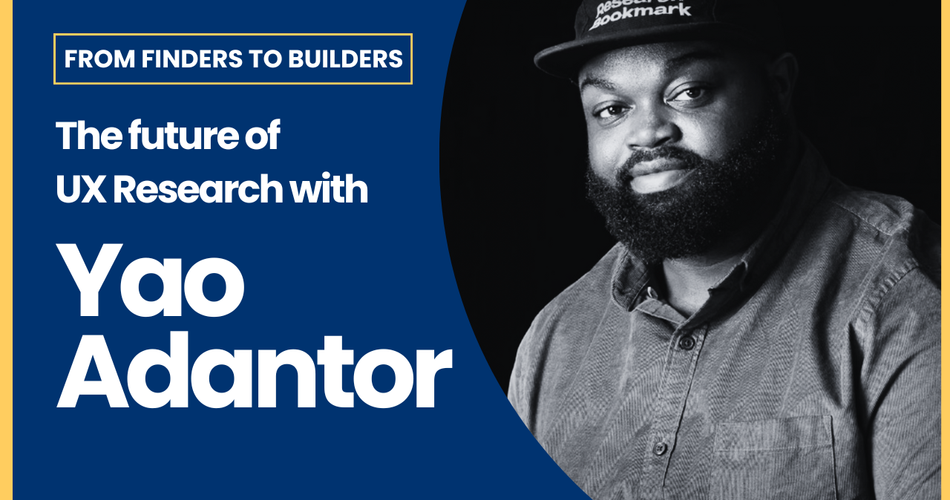Introduction
Yao Adantor is a the founder of Research Bookmark, the world's biggest knowledge engine for user experience and a Senior Researcher, currently leading research projects at Ford Motors.
In a recent enlightening conversation, UX research expert Yao Adantor shared his optimistic vision for the future of UX research, highlighting its potential for growth and democratization. Yao delved into the nuances of the UX industry, the importance of effective communication with business stakeholders, and the evolving role of UX researchers in various sectors.
Democratizing UX Research
Yao envisions a future where UX research becomes more democratized, driven by enhanced communication and understanding between UX professionals and business stakeholders. He emphasizes that businesses often have a limited understanding of how their tools impact users.
This gap presents a significant opportunity for UX researchers to demonstrate the value of their work. By effectively communicating the reasons behind UX methods and user interactions, researchers can bridge this gap and align better with business goals.
Stepping Outside the UX Bubble
He advises UX researchers to step outside their comfort zones and immerse themselves in the business environment. While the UX community is supportive and collaborative, the real impact is made by understanding and speaking the language of business.
Building soft skills, learning the business lingo, and understanding the mindset of colleagues are crucial steps for UX researchers to integrate into the business fabric and drive meaningful change.
Highlighting the Value of UX Research
One of the critical challenges in UX research is demonstrating its value to companies that may not yet appreciate its importance. Adantor suggests linking UX research efforts to key business performance indicators (KPIs) such as market share and product reception.
By aligning UX research with the primary goals of a company, such as sales growth and customer satisfaction, researchers can initiate impactful conversations with business leaders and secure buy-in for their initiatives.
Becoming a Strategic Partner
According to Yao, for UX researchers to become integral to a company, they must evolve from being mere tools to strategic partners. This transformation involves understanding the core objectives of the business and contributing insights that help other departments unlock new knowledge.
He believes that many businesses underachieve because they lack the imagination to go beyond their current state. UX researchers can play a pivotal role in sparking innovation and helping businesses realize their full potential.
Building a Research Culture
The role of the first UX researcher in an organization is both an opportunity and a challenge. This individual sets the foundation for future UX practices and influences the company's perception of UX research. Adantor emphasizes the importance of non-territoriality and collaboration.
By sharing knowledge and fostering a supportive environment, the first researcher can establish a positive and sustainable research culture that benefits the entire organization.
Learning and Growth in UX Research
Adantor outlines three levels of learning for UX researchers:
- Background Learning: Leveraging past experiences and soft skills to connect with people.
- Formal Education: Acquiring structured knowledge through formal education and practical experience in a business setting.
- Intentional Learning: Continuously improving technical skills through intentional practice and specialized training.
Researchers should focus on their unique strengths and the specific needs of their environment, whether it's mastering in-person interviews or becoming an expert in survey methodologies.
Final Recommendations
Adantor offers three essential recommendations for first-time researchers joining an organization:
- Understand the People: Take time to meet everyone and understand the company culture. Building relationships and learning how people think and operate is crucial.
- Learn the Business: Deeply understand the company’s goals and how it measures success. Knowing the business landscape will make your research more relevant and impactful.
- Be Intentional: Focus on continuous improvement and tailor your learning to the specific needs of your role and organization.
Check out the full episode here:

You can find more about Yao here:


Subscribe to our email newsletter and unlock access to members-only content and exclusive updates.



Comments